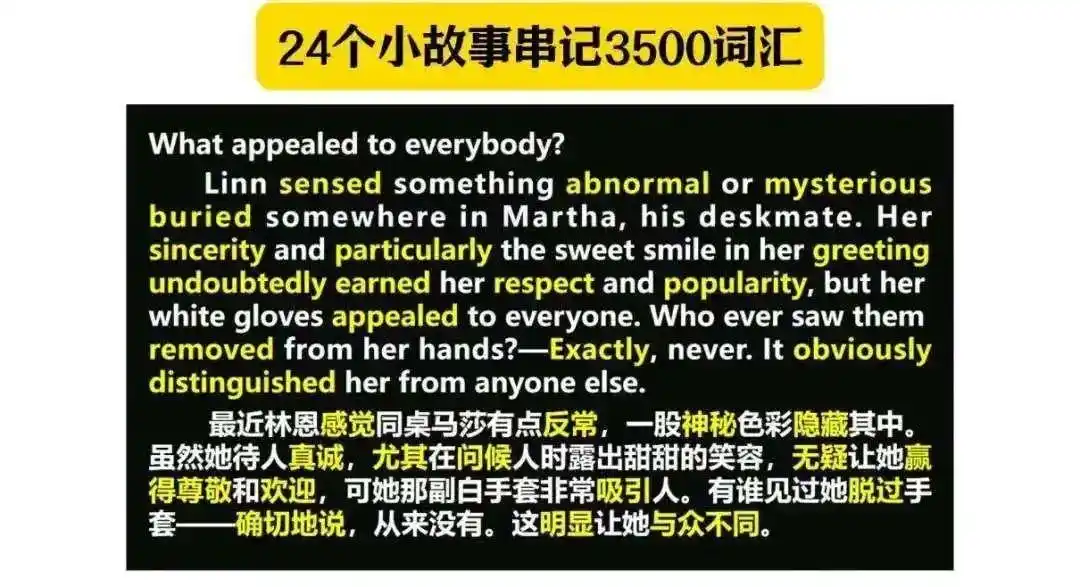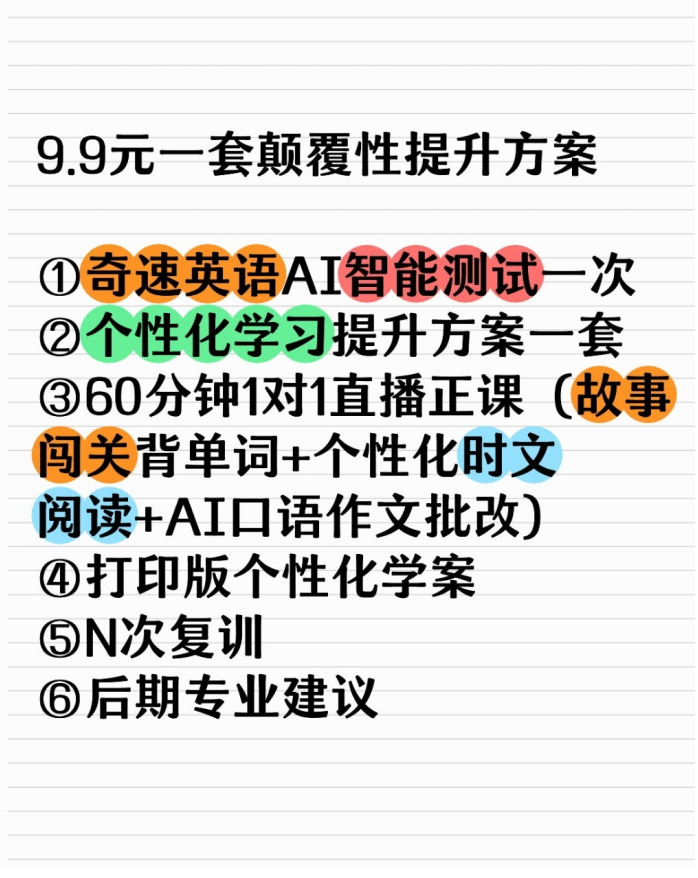-

评论
-

收藏
-

点赞

高中英语阅读理解|易混淆词组 120 组
阅读量:1612 2025.05.03

以下是奇速英语AI伴学高中英语阅读理解中常出现的120组易混淆词组,按类别整理并标注常见误解,帮助精准辨析:
一、动词短语(易误解含义)
1. look up to —— 尊敬(≠ 抬头看)
2. make up —— 编造/弥补/组成(≠ 化妆,“化妆”是make up for)
3. run into —— 偶遇(≠ 跑进)
4. look out —— 小心(≠ 向外看)
5. take in —— 吸收/欺骗(≠ 带进去)
6. give out —— 分发/耗尽(≠ 给出,“给出”是give away)
7. turn down —— 拒绝/调小(≠ 转向下)
8. put off —— 推迟(≠ 扑灭,“扑灭”是put out)
9. go through —— 经历/仔细检查(≠ 穿过)
10. come up with —— 想出(≠ 上来)
11. take over —— 接管(≠ 带走)
12. break down —— 故障/崩溃(≠ 打破)
13. carry on —— 继续(≠ 携带)
14. hold up —— 举起/阻碍(≠ 握住)
15. keep up with —— 跟上(≠ 保持)
16. look forward to —— 期待(≠ 向前看)
17. make out —— 辨认/理解(≠ 制作)
18. set aside —— 留出/忽视(≠ 建立)
19. take on —— 承担/呈现(≠ 带走)
20. turn up —— 出现/调大(≠ 转向)
21. give in —— 屈服(≠ 给出)
22. put away —— 收拾/储存(≠ 放置)
23. run out (of) —— 耗尽(≠ 跑出)
24. set off —— 出发/引发(≠ 设定)
25. take after —— 像(≠ 带走)
二、动词短语(形近/易混搭配)
1. rise vs. raise
- rise(自然升起):The sun rises.(≠ 人为举起)
- raise(人为举起/筹集):raise hands/money
1. lie vs. lay
- lie(躺):lay(过去式),lain(过去分词)
- lie(说谎):lied(规则变化)
- lay(放置):laid(规则变化)
1. adapt vs. adopt
- adapt(适应):adapt to life
- adopt(收养/采纳):adopt a child/a plan
1. affect vs. effect
- affect(v. 影响):The rain affected the game.
- effect(n. 效果):have an effect on
1. compose vs. consist
- compose(组成,被动):be composed of
- consist(组成,主动):consist of
1. cost vs. spend vs. take
- cost(物作主语):The book costs $10.
- spend(人作主语):spend time/money on sth.
- take(it作形式主语):It takes time to learn.
1. borrow vs. lend
- borrow(借入):borrow sth. from
- lend(借出):lend sth. to
.jpg)
1. hear vs. listen
- hear(听到,结果):I heard a noise.
- listen(听,动作):listen to the teacher
1. seat vs. sit
- seat(使就座,及物):seat oneself
- sit(坐,不及物):sit down
1. arrive at vs. arrive in
- arrive at(小地点):arrive at the station
- arrive in(大地点):arrive in Beijing
1. dress vs. wear vs. put on
- dress(穿,后接人):dress the child
- wear(穿着,状态):wear a coat
- put on(穿上,动作):put on shoes
1. reply vs. answer
- reply(正式回复,后接to):reply to a letter
- answer(直接回答):answer a question
1. fit vs. suit
- fit(尺寸合适):The shirt fits me.
- suit(风格合适):The color suits you.
1. steal vs. rob
- steal(偷物):steal sth. from sb.
- rob(抢人):rob sb. of sth.
1. hanged vs. hung
- hanged(绞死):He was hanged.
- hung(悬挂):The picture was hung.
1. lay vs. lie(易混变形)
- lay(放置):laid-laid(规则)
- lie(躺):lay-lain(不规则)
1. rise vs. raise(主动/被动)
- rise(主动):Prices rise.
- raise(被动):Prices are raised.
1. compete vs. complete
- compete(竞争):compete with
- complete(完成):complete a task
1. principle vs. principal
- principle(原则):moral principles
- principal(校长/主要的):the principal of a school
1. dessert vs. desert
- dessert(甜点):have dessert
- desert(沙漠/抛弃):desert an island

三、介词短语(易混含义)
1. in case of vs. in the case of
- in case of(万一):In case of fire, call 119.
- in the case of(就…而言):In the case of math, he is good.
1. in charge of vs. in the charge of
- in charge of(负责,主动):She is in charge of the class.
- in the charge of(被负责,被动):The class is in the charge of her.
1. in terms of vs. in view of
- in terms of(就…而言):In terms of quality, it’s good.
- in view of(鉴于):In view of the rain, we cancel the trip.
1. on account of vs. because of
- 均表示“因为”,on account of更正式
1. on purpose vs. by accident
- on purpose(故意):He broke it on purpose.
- by accident(偶然):I met him by accident.
1. in front of vs. in the front of
- in front of(外部前面):A tree is in front of the house.
- in the front of(内部前面):The teacher stands in the front of the classroom.
1. at the end of vs. in the end
- at the end of(在…末端):at the end of the road
- in the end(最终):In the end, he succeeded.
1. by means of vs. by no means
- by means of(通过…方式):learn by means of reading
- by no means(绝不):By no means should you give up.
1. in place of vs. in the place of
- in place of(代替):use plastic in place of wood
- in the place of(在…地方):He is in the place of Tom.
1. out of question vs. out of the question
- out of question(毫无疑问):Out of question, he is right.
- out of the question(不可能):It’s out of the question to finish today.
1. in favor of vs. in honor of
- in favor of(支持):vote in favor of the plan
- in honor of(纪念):hold a party in honor of the hero
1. on time vs. in time
- on time(准时):arrive on time
- in time(及时):catch the bus in time
1. for example vs. such as
- for example(举例,可单独用):For example, he likes math.
- such as(列举,后接多个例子):subjects such as math and English
1. due to vs. thanks to
- due to(由于,中性):delay due to rain
- thanks to(多亏,积极):thanks to your help
1. in addition vs. in addition to
- in addition(此外,单独用):In addition, he is good at sports.
- in addition to(除…之外):In addition to math, he likes English.
1. instead vs. instead of
- instead(代替,副词):He didn’t go; I went instead.
- instead of(代替,介词短语):instead of going out
1. in return vs. in turn
- in return(作为回报):give him a gift in return
- in turn(依次/反过来):speak in turn; theory affects practice and in turn is affected by it
1. at the cost of vs. at the price of
- at the cost of(以…为代价,多指代价大):success at the cost of health
- at the price of(以…价格):buy at the price of $10
1. in search of vs. in charge of
- in search of(寻找):look in search of water
- in charge of(负责):be in charge of a team
1. with the help of vs. under the help of
- 正确搭配:with the help of(在…帮助下),无under the help of
.jpg)
四、形近词(拼写/发音易混)
1. accept vs. except
- accept(接受):accept an invitation
- except(除…之外):except for the rain
1. access vs. assess
- access(入口/使用权):access to the internet
- assess(评估):assess the value
1. accident vs. incident
- accident(意外事故):car accident
- incident(事件,多指不愉快):political incident
1. adapt vs. adopt vs. adept
- adapt(适应);adopt(收养/采纳);adept(熟练的,be adept at)
1. imply vs. infer
- imply(暗示,主语为事物):The story implies a lesson.
- infer(推断,主语为人):I infer a lesson from the story.
1. moral vs. mortal
- moral(道德的):moral standards
- mortal(致命的):mortal wound
1. complement vs. compliment
- complement(补充):A complements B.
- compliment(赞美):give a compliment
1. dessert vs. desert(同前第45组,重复强调)
2. principle vs. principal(同前第44组,重复强调)
3. stationary vs. stationery
- stationary(静止的):a stationary car
- stationery(文具):buy stationery
1. council vs. counsel
- council(委员会):city council
- counsel(建议/律师):legal counsel
1. device vs. devise
- device(设备,n.):a medical device
- devise(设计,v.):devise a plan
1. historic vs. historical
- historic(有历史意义的):a historic event
- historical(历史上的):historical facts
1. industrial vs. industrious
- industrial(工业的):industrial development
- industrious(勤奋的):an industrious student
.jpg)
1. perspective vs. prospect
- perspective(视角):from my perspective
- prospect(前景):good career prospect
1. rise vs. raise(同前第26组,重复强调)
2. sensitive vs. sensible
- sensitive(敏感的):be sensitive to criticism
- sensible(明智的):a sensible decision
1. imply vs. infer(同前第70组,重复强调)
2. compose vs. dispose
- compose(组成/创作):compose a song
- dispose(处理):dispose of waste
1. ensure vs. insure vs. assure
- ensure(确保):ensure safety
- insure(投保):insure the car
- assure(使确信):assure sb. of sth.
五、其他易混淆词组(搭配/语境)
1. a number of vs. the number of
- a number of(许多,后接复数名词,谓语复数)
- the number of(…的数量,后接复数名词,谓语单数)
1. each vs. every
- each(强调个体,可接of):each of us
- every(强调整体,不接of):every student
1. few vs. a few vs. little vs. a little
- few/a few(修饰可数名词,few表否定,a few表肯定)
- little/a little(修饰不可数名词,little表否定,a little表肯定)
1. so…that vs. such…that
- so+形容词/副词:so fast that
- such+名词:such a fast car that
1. too…to vs. enough to
- too…to(太…而不能):too tired to work
- enough to(足够…可以):old enough to go to school
1. between vs. among
- between(两者之间):between A and B
- among(三者及以上):among the students
1. ago vs. before
- ago(现在之前,用于过去时):three days ago
- before(过去某时之前,用于完成时):three days before
.jpg)
1. maybe vs. may be
- maybe(副词,也许):Maybe he is right.
- may be(情态动词+动词,可能是):He may be right.
1. hard vs. hardly
- hard(努力地/硬的):work hard
- hardly(几乎不):hardly any time
1. late vs. lately
- late(晚的):arrive late
- lately(最近):lately I’ve been busy
1. live vs. alive vs. living
- live(现场的/活着的,仅修饰物):a live concert
- alive(活着的,表语/后置定语):He is alive.
- living(活着的,前置定语):living things
1. deep vs. deeply
- deep(具体深):dig deep
- deeply(抽象深,如情感):deeply moved
1. high vs. highly
- high(具体高):jump high
- highly(抽象高,高度地):highly praised
1. most vs. mostly
- most(最/大多数):most students
- mostly(主要地):The book is mostly about history.
1. near vs. nearly
- near(附近的/接近,介词/形容词):near the school
- nearly(几乎):nearly finish
2. quite vs. quiet
- quite(相当):quite good
- quiet(安静的):keep quiet
3. real vs. true
- real(真实存在的):a real story
- true(符合事实的):a true story
4. voice vs. noise vs. sound
- voice(嗓音):in a low voice
- noise(噪音):make noise
- sound(泛指声音):the sound of music
5. problem vs. question
- problem(难题,需解决):solve a problem
- question(问题,需回答):answer a question
6. receive vs. accept
- receive(收到,客观):receive a gift
- accept(接受,主观):accept a gift
7. scene vs. scenery
- scene(具体场景):a beautiful scene
- scenery(总称,风景):natural scenery
8. task vs. job vs. work
- task(具体任务,可数):finish a task
- job(工作,可数,多指职业):find a job
- work(工作,不可数):hard work
9. win vs. beat
- win(赢得比赛/奖项):win the game
- beat(击败对手):beat the team
10. zone vs. area
- zone(特定区域,如时区、保护区):time zone
- area(泛指区域):a large area
.jpg)
.jpg) 11. custom vs. habit
11. custom vs. habit
- custom(社会习俗):cultural customs
- habit(个人习惯):form a habit
12. damage vs. destroy
- damage(部分损坏):damage the car
- destroy(彻底摧毁):destroy the house
13. force vs. power vs. strength
- force(武力/力量):use force
- power(权力/能量):political power
- strength(体力/优势):physical strength
14. gift vs. present
- 均表示“礼物”,gift更正式,可指天赋(gift for music)
15. journey vs. trip vs. travel
- journey(长途旅行,尤指陆地):a long journey
- trip(短途旅行):a day trip
- travel(泛指旅行,不可数):travel abroad
16. method vs. way vs. approach
- method(系统方法):teaching methods
- way(通用方式,后接to do/of doing):the way to do sth.
- approach(具体方法,后接to sth.):an approach to learning
17. price vs. prize
- price(价格):the price of the book
- prize(奖品):win a prize
18. route vs. road
- route(路线):the best route
- road(道路):a country road
19. scene vs. sight
- scene(场景):a tragic scene
- sight(景象/视力):the sight of the sea; lose sight
20. strike vs. hit vs. beat
- strike(罢工/撞击,可指突然想到):strike a match; it strikes me that…
- hit(击中):hit the target
- beat(反复打/跳动):beat a drum; heart beats
21. view vs. sight vs. scenery
- view(视野/观点):a beautiful view; in my view
- sight(景象,同前);scenery(风景总称,同前)
记忆小贴士
1. 语境记忆:在《奇速英语24个故事串记高考3500词汇》例句中理解词组含义,避免孤立记忆。
2. 对比表格:整理易混词组的含义、搭配和例句,可视化区分。
3. 真题实战:通过天天更新的奇速英语时文阅读和高考真题练习,标注错题中的易混词组,针对性强化。
掌握这些词组,阅读理解中的词义误解问题将大幅减少,阅读速度和准确率也会显著提升!






.jpg)




